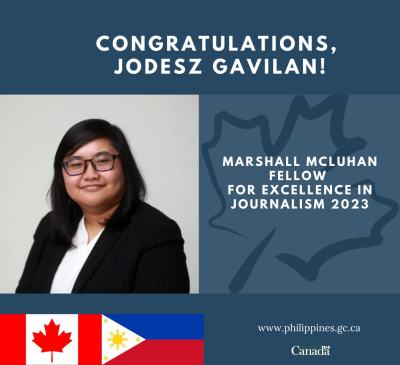Building Communities: The Evolving Role of Journalists in Covering Human Rights Stories in the Philippines

By Jodesz Gavilan
2023 Marshall McLuhan Fellow
Notes from her Lecture in Canada 2024
Last year, I met a mother who lost three loved ones in one night. Her husband, son-in-law, and brother were killed by unknown men inside their own home. They were begging for mercy for them to be spared, but they were repeatedly shot at close range.
This all happened while the women and children in the family were held hostage in one of the rooms. They heard everything, the screams, the cries, the gunshots, and then the silence. She had no choice but to leave everything behind. The house she lived in for close to five decades, the community she knew all her life. The livelihood that supported her family. She packed her bags and took her surviving relatives to a settlement area two hours away from their former home.
And since then, she has had to find ways to come up with money for rent, food, and other necessities for seven people. She has not even dealt with the trauma, or even thought of getting justice for her slain loved ones. The mother’s story is not unique. Their experiences reflect what thousands of other families went through because of Rodrigo Duterte’s violent war on drugs.
At least 6,000 people were killed in police operations alone. If you include those killed vigilante-style, or whose bodies were found on the street, the death toll is estimated to reach 30,000.
This has been my job for the past seven years or so as a human rights reporter for Rappler. I go to the families after the killing, after the death anniversaries to see how they are doing, how are they coping in the aftermath, or how they are trying to find justice.
I do this because I want to put on record that the impact of Duterte’s drug war did not stop when the body was buried. The impact manifests itself in the form of thousands of orphaned children forced to drop out of school, or on mothers left with no choice but to seek greener pastures and leave their children behind.
This is how I view my work as a journalist. While I have to also cover policies and institutions, I make sure that I put people at the center of my stories. For me, that is what human rights reporting should do. At the end of the day, a reader’s main takeaway should be how the policies affect the vulnerable communities.
I do not see it as giving voice to the voiceless, because the families of victims have the agency to do their own talking. Instead, I just amplify their calls and their stories. This is where I see my role now as a journalist. I am a part of a community committed to bring forward the issues, and not some sort of a messiah that would magically fix things.
This was not an easy thing to do. It took years and years of practice to do it. And these are the lessons I’ve learned along the way.
- Building trust is part of journalism.
A huge part of journalism is building trust on different facets. There is the part that you have to make your audience trust you as a credible source of news. There’s also the fact that you have to earn the trust of your editors.
But I’d like to focus on one aspect: Ensuring that the people at the center of your stories see you as someone trustworthy. This is important not only because you need to get the story of them, but because they have to see you as someone not just as a journalist, but as a human who wants to listen to their stories. Journalism, especially human rights reporting, is not just a one-off thing. You just don’t go to a community, get your soundbite or quote, and then leave. It is not only lazy, but a disservice to the people who are willing to tell you their stories.
Before you could get to them, you have to go through layers to establish your credibility and build trust. I first experienced this when I was starting out as a journalist back in 2014, even before the Duterte years. I covered the issue of hunger and malnutrition in the country’s poorest neighborhoods. My work led me to connect with various civil society organizations that implemented projects in these areas, and in turn, also to the people they are helping.
Fast forward to the Duterte presidency, some of the groups I previously worked with are also the ones involved in helping drug war victims’ families. Unfortunately, some of the families I talked to before also became victims themselves. So because I already have that level of trust built, I was able to write about them. But in cases where I have no prior connection to, I start from the beginning.
Why is this important? You have to remember that what you’re getting from human rights victims are not just a random opinion on a general issue. You are asking them to remember what could be the worst experience they’ve had in their lives, and that would entail…[unfinished thought.] It is through this that we see beyond the walls they built in response to the traumatic events that they experienced.
- It is okay to feel about your story.
The second lesson I’ve learned is that it is vital that we feel strongly about our stories, or the issue we are reporting on. Being apathetic, or being too far removed, leaves a sense that you’re just there to write and nothing more. When you let yourself feel things in the process, it radiates in the way you handle everything. That includes from the interviews to the writing itself. With so much sensitivity, respect, and that intense desire to give justice to the trust given to you by the families.
- The journalism process does not stop when a story is published. It is just (almost) the beginning.
Stop thinking that once the story is published in the newspaper, or on the internet, that it is out of our hands. That is something that Filipino journalists have long grappled with. But fortunately, many are embracing the value of seeing journalism as bigger than published stories.
So what usually happens is when a story is published, I make sure that I make derivatives out of it. I make videos or even Tiktok because these target certain generations that my articles alone cannot reach.
You also have to ensure that the readers know what to do. And it’s sometimes as simple as putting action points in your stories. An example is this is how I placed information on how people donate to an organization that helps families of drug war victims exhume their loved and give them a proper burial.
Here is another example. I did not explicitly say in my story that people should donate. But I included how important support from communities is for those left behind. Someone got that cue and reached out if I could connect them to the victim so they could give them a scholarship.
You should also see how to elevate or increase the discourse on the issues raised in your stories. And this could be done by simply partnering with groups and idea-based communities where they could discuss among themselves.
You also need to acknowledge the huge role the government could do if it plays its cards right. So as a journalist, we have to shed that automatic animosity and just reach out to them and hope for the best.
By doing all of these, you highlight the role of the community in bringing forward more discussion points on the issues you’ve written about. To acknowledge that you do not have all the answers is not an admission of failure, but a door opening to greater community building.
- Remove the barrier between journalists and readers.
Speaking of doors, a good step towards community building is to remove barriers between journalists and readers. You have to make readers feel and see that you are not on your ivory tower, you are part of the community they could easily give feedback to, or even throw at story ideas.
At Rappler, we recently launched an application where readers could easily talk to us journalists. You just download the app, join the issue-based community you want to be a part of, and Rappler journalists covering those issues are always there to answer any question. When you do these, you make the readers feel that they are part of the community. That they too could do something about the issues they are also seeing.
- Know your limitations, as a journalist and a human being.
Because at the end of a day, a journalist could only do so much. And it takes a village, a community, to spark change. I went into journalism believing that I could change the world. But I came to realize that you can’t save everybody. That doesn’t make me less of a journalist.
I’ve come to base my worth on the simple things. When my story leads to a family receiving necessary support, that is already a huge thing. The feeling I get when that happens is similar to what I feel when you find out that the stories I’ve written were cited in various legal documents at the International Criminal Courts and the United Nations.
So what can you do?
You have to see yourself as a member of the community. You’re not just a spectator. The issues I’m writing about as a human rights reporter will mostly affect people outside of the usual communities. And lastly, please support journalism.
Thank you.
ABOUT JODESZ GAVILAN
Jodesz Gavilan is a writer and researcher for Rappler and its investigative arm, Newsbreak. She covers the human rights and impunity beats, producing in-depth and investigative reports, particularly on the quest for justice of victims of former president Rodrigo Duterte’s war on drugs and war on dissent. She also closely follows international bodies such as the International Criminal Court and the United Nations Human Rights Council.

Filed under: Uncategorized | Closed
Tags: articles, communication, culture, education, ideas
